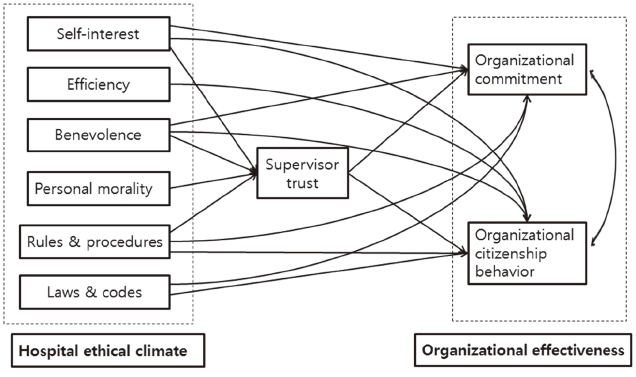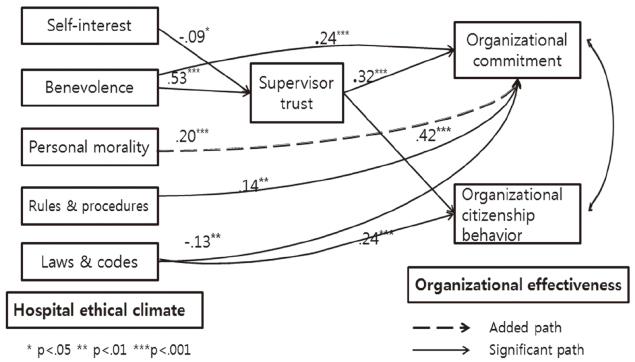J Korean Acad Nurs.
2016 Dec;46(6):824-835. 10.4040/jkan.2016.46.6.824.
Path analysis of the Influence of Hospital Ethical Climate Perceived by Nurses on Supervisor Trust and Organizational Effectiveness
- Affiliations
-
- 1Department of Nursing, Changwon National University, Changwon, Korea.
- 2College of Nursing·Institute of Health Sciences, Gyeongsang National University, Jinju, Korea. msjung@gnu.ac.kr
- KMID: 2424654
- DOI: http://doi.org/10.4040/jkan.2016.46.6.824
Abstract
- PURPOSE
The purpose of this study was to analyze the paths of influence that a hospital's ethical climate exerts on nurses' organizational commitment and organizational citizenship behavior, with supervisor trust as the mediating factor, and verify compatibility of the models in hospital nurses.
METHODS
The sample consisted of 374 nurses recruited from four hospitals in 3 cities in Korea. The measurements included the Ethical Climate Questionnaire, Supervisor Trust Questionnaire, Organizational Commitment Questionnaire and Organizational Citizenship Behavior Questionnaire. Ethical Climate Questionnaire consisted of 6 factors; benevolence, personal morality, company rules and procedures, laws and professional codes, self-interest and efficiency. Data were analysed using SPSS version 18.0 and AMOS version 18.0.
RESULTS
Supervisor trust was explained by benevolence and self-interest (29.8%). Organizational commitment was explained by benevolence, supervisor trust, personal morality, and rules and procedures (40.4%). Organizational citizenship behavior was explained by supervisor trust, laws and codes, and benevolence (21.8%).
CONCLUSION
Findings indicate that managers need to develop a positive hospital ethical climate in order to improve nurses' trust in supervisors, organizational commitment and organizational citizenship behavior.
Keyword
MeSH Terms
Figure
Reference
-
1. Jeong JH, Kim KH, Kim JS. The risk factors influencing turnover intention of nurses. J Korean Acad Nurs Adm. 2008; 14(1):35–44.2. Noh YG, Jung MS, Lee YS. Nurse's job satisfaction and organizational commitment according to hospital ethical climate types. J Korean Acad Nurs Adm. 2013; 19(4):513–524. DOI: 10.11111/jkana.2013.19.4.513.3. Victor B, Cullen JB. A theory and measure of ethical climate in organizations. In : Frederick WC, editor. Research in corporate social performance and policy. Greenwich, CT: JAI Press;1987. p. 51–71.4. Victor B, Cullen JB. The organizational bases of ethical work climates. Adm Sci Q. 1988; 33(1):101–125.5. Nam MJ, Kwag SH. The effect of individual-organizational variable on ethical decision-making process in the organizational context. Manag Inf Syst Rev. 2011; 30(1):39–69.6. Reilly BJ, Kyj MJ. Economics and ethics. J Bus Ethics. 1990; 9(9):691. DOI: 10.1007/BF00386351.7. Yoo BA. The impact of employee's ethical climate perception on organizational citizenship behaviors: Focused on the moderating and mediating effect of trust [dissertation]. Incheon: Inha University;2007. 1–110.8. Jung YM. A study on the effects of the perception of organizational members for the ethical climate on job satisfaction, organizational commitment and organizational citizenship behavior: Focused on the mediating role of trust in superior [master's thesis]. Gyeong-San: Yeungnam University;2006. 1–136.9. Lee SS, Lee SY, Cheong IS. The effect of ethical climate on the job satisfaction and organizational commitment. J Organ Manage. 2008; 32(2):1–21.10. Cullen JB, Parboteeah P, Victor B. The effects of ethical climates on organizational commitment: A two-study analysis. J Bus Ethics. 2003; 46(2):127–141. DOI: 10.1023/A:1025089819456.11. Martin KD, Cullen JB. Continuities and extensions of ethical climate theory: A meta-analytic review. J Bus Ethics. 2006; 69(2):175–194. DOI: 10.1007/s10551-006-9084-7.12. Tsai MT, Huang CC. The relationship among ethical climate types, facets of job satisfaction, and the three components of organizational commitment: A study of nurses in Taiwan. J Bus Ethics. 2008; 80(3):565–581. DOI: 10.1007/s10551-007-9455-8.13. Huang CC, You CS, Tsai MT. A multidimensional analysis of ethical climate, job satisfaction, organizational commitment, and organizational citizenship behaviors. Nurs Ethics. 2012; 19(4):513–529. DOI: 10.1177/0969733011433923.14. Dirks KT, Ferrin DL. Trust in leadership: Meta-analytic findings and implications for research and practice. J Appl Psychol. 2002; 87(4):611–628.15. Laschinger HKS, Shamian J, Thomson D. Impact of magnet hospital characteristics on nurses' perceptions of trust, burnout, quality of care, and work satisfaction. Nurs Econ. 2001; 19(5):209–219.16. Lee SY. The relationships of superior's leadership to supervisory trust and organizational commitment of nurses. J Korean Acad Nurs Adm. 2007; 13(2):208–218.17. McCarthy J, Deady R. Moral distress reconsidered. Nurs Ethics. 2008; 15(2):254–262. DOI: 10.1177/0969733007086023.18. Hart SE. Hospital ethical climates and registered nurses' turnover intentions. J Nurs Scholarsh. 2005; 37(2):173–177. DOI: 10.1111/j.1547-5069.2005.00030.x.19. Chen CH, Wang SJ, Chang WC, Hu CS. The effect of leader-member exchange, trust, supervisor support on organizational citizenship behavior in nurses. J Nurs Res. 2008; 16(4):321–328.20. Lee H. Related factor of organizational effectiveness in hospital: Self-efficacy, faith in supervisor [dissertation]. Seoul: Yonsei University;2003. 1–139.21. Yu JP. The concept and understanding of structural equation modeling. Seoul: Hannare Publishing Co.;2012. p. 1–567.22. Park J, Yun E, Han S. Factors influencing nurses' organizational citizenship behavior. J Korean Acad Nurs. 2009; 39(4):499–507. DOI: 10.4040/jkan.2009.39.4.499.23. Cullen JB, Victor B, Bronson JW. The ethical climate questionnaire: An assessment of its development and validity. Psychol Rep. 1993; 73(2):667–674. DOI: 10.2466/pr0.1993.73.2.667.24. Mowday RT, Steers RM. The measurement of organizational commitment. J Vocat Behav. 1979; 14(2):224–247. DOI: 10.1016/0001-8791(79)90072-1.25. Williams LJ, Anderson SE. Job satisfaction and organizational commitment as predictors of organizational citizenship and in-role behaviors. J Manage. 1991; 17(3):601–617. DOI: 10.1177/014920639101700305.26. Cook J, Wall T. New work attitude measures of trust, organizational commitment and personal need non-fulfilment. J Occup Psychol. 1980; 53(1):39–52. DOI: 10.1111/j.2044-8325.1980.tb00005.x.27. Yu JP. A misunderstanding and fallacy of structural equation modeling. . Seoul: Hannarae Publishing Co.;2014. p. 1–318.28. Kim JY, Park SE, Lee MR. An empirical study on the relationships among ethical leadership, trust and organizational citizenship behavior. Korean J Resour Dev. 2010; 13(2):1–19.29. Woo CB, Yoon TI, Park HS. A study on the impacts of perceived ethical climate on the job satisfaction and organizational commitment. J Hum Resour Manag Res. 2010; 17(1):289–311.30. Gu MO, Cho YA, Cho MS, Eun Y, Jeong JS, Jung IS, et al. Adaptation of intravenous infusion nursing practice guideline. J Korean Clin Nurs Res. 2013; 19(1):128–142.
- Full Text Links
- Actions
-
Cited
- CITED
-
- Close
- Share
- Similar articles
-
- Effects of Ethical Leadership on Perceived Organizational Support and Organizational Commitment of Nurses in a Hospital: Mediating Role of Perceived Organizational Support
- Impact of Superior's Ethical Leadership as Perceived by Nurses on Nursing Performance: Mediating Effect of Faith in Supervisor
- Influence of Ethical Leadership of Nursing Unit Managers on Job Embeddedness of Staff Nurses: Focusing on Mediating Effect of Trust in Supervisor
- Effects of Organizational Injustice on Negative Behaviors of Employees: Focusing on the Mediating Effect of Trust
- Moral Sensitivity, Empathy and Perceived Ethical Climate of Psychiatric Nurses Working in the National Mental Hospitals



